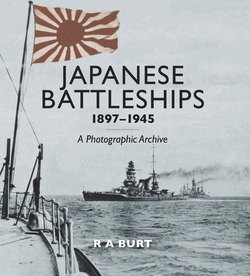Читать книгу Japanese Battleships, 1897?1945 - R. A. Burt - Страница 9
На сайте Литреса книга снята с продажи.
ОглавлениеASAMA CLASS
Displacement: 9,750 tons normal load
Dimensions: Length: 442ft oa; Beam: 67ft; Draught: 24ft 6in mean
Armament: 4 × 8in 40cal; 14 × 6in 40cal; 12 × 12pdr; 7 × 3pdr; TT: 5 × 18in
Armour: Main belt: 7in–3½in (Harvey); Barbettes: 6in; Turrets: 6in; Casemates: 6in; Decks: 2½in–1in; Conning tower: 14in
Machinery: Two sets four-cylinder, triple-expansion engines driving two screws, twelve cylindrical boilers
Designed SHP: 18,000 (forced) for 21 knots
Complement: 670
ASAMA
Laid down: 1897, Armstrong’s, Newcastle
Completed: March 1899
Launched: 22 March 1898
Fate: Sold for scrapping, 1947
TOKIWA
Laid down: 1897, Armstrong’s, Newcastle
Completed: March 1899
Launched: April 1899
Fate: Sunk by US aircraft, 8 August 1945
Asama 1902
Asama at the Coronation Fleet Review at Spithead in 1902. Post-war (Sino-Japanese) replenishment formulated the Asama and Tokiwa which were basically large armoured cruisers, although during the Russo-Japanese War they took their place in the line of battle alongside contemporary battleships. Designed and constructed in England, they had a distinctively foreign appearance, and yet were similar to the British Edgar-class. Both ships received modernisation throughout their long and active careers – both being nearly forty-seven years old before finally facing the scrapper’s torch.
Tokiwa 1921
Tokiwa c1921. She was converted into a minelayer in 1922 and was equipped with up to 700 mines. Later, during a refit in 1938, her 8in guns and turrets were removed and replaced by a small anti-aircraft (AA) battery.
Asama in 1935 as seen from the starboard quarter
In March 1935 Asama left Yokosuka on a 20,000-mile training cruise visiting Hong Kong, Singapore, many major ports in Australia, Suva, Honolulu, Truk and Saipan. Completing her very successful voyage she returned to Japan in July. The photo shows her as a training ship during that cruise.
